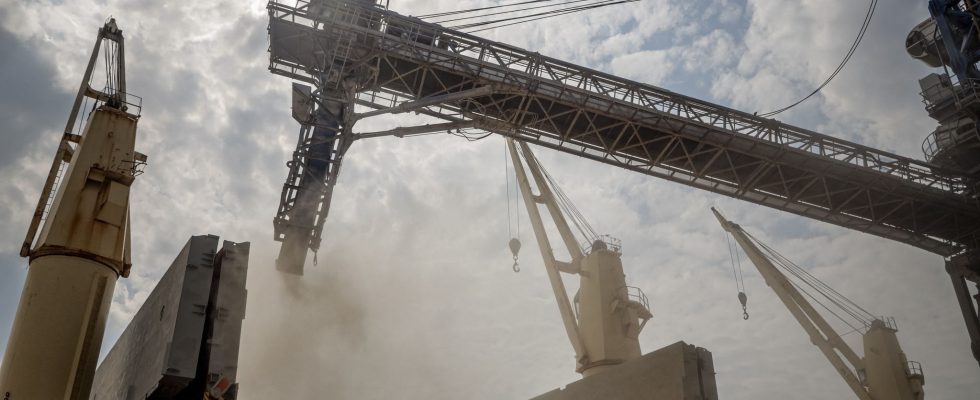Once again, Putin uses the weapon of hunger. The agreement on the transit of Ukrainian grain in the Black Sea expires Monday evening at midnight in Istanbul (21:00 GMT). Considered essential to the world supply, it gives rise to tense negotiations to convince Moscow to renew it. Signed in July 2022 with Russia and Ukraine under the aegis of Turkey, a facilitating country, and the United Nations, the Black Sea Grains Initiative aims to alleviate the risk of famine in the world by guaranteeing, despite the war, the placing on the market of Ukrainian agricultural products.
Signed in July 2022 in Istanbul and already renewed twice, the agreement expires Monday evening at midnight in Istanbul (9:00 p.m. GMT). Over the past year, it has enabled nearly 33 million tonnes of cereals to be taken out of Ukrainian ports despite the conflict. Several things make it possible to say that the agreement is threatened. On the night of Tuesday to Wednesday July 12, Russian drone attacks targeted a grain terminal in the Odessa region, in southern Ukraine, which is home to three key ports for the export of grain.
The agreement is threatened for several reasons. On July 4, Russia warned that it saw “no reason” to extend the agreement on Ukrainian grain exports, complaining of obstacles to its own deliveries of agricultural products. Russian President Vladimir Putin said on Saturday that the main objective of the Ukrainian grain agreement, which expires on July 17, had not been achieved, during a phone call with his South African counterpart Cyril Ramaphosa.
The main objective of the agreement, “not yet achieved”
“Vladimir Putin stressed that the obligations set out in the Russia-UN memorandum on the removal of obstacles for the export of Russian food products and fertilizers are still not fulfilled,” the Kremlin said. “The main objective of the agreement, the delivery of cereals to countries in need, particularly on the African continent, is not achieved”, continues the Russian presidency in a press release reporting this conversation between Vladimir Putin and Cyril Ramaphosa.
According to Moscow, only 3% of the 32 million tonnes of foodstuffs produced by kyiv over the past year are delivered to the poorest countries. Figures disputed by the EU which speaks of 49% of these exports which have benefited these populations. For Brussels, a non-renewal of the initiative would cause a rise in food prices on the world market, with the consequence of dragging poor countries into a food crisis.
However, on Friday July 14, Turkish President Recep Tayyip Erdogan, mediator between kyiv and Moscow, assured that Vladimir Putin was “agree” to extend this vital agreement on Ukrainian cereals. But the Kremlin has denied making any statement about it. Thursday, Vladimir Putin had already deplored that “not a single” Russian request was taken into account during negotiations to extend the agreement.
A lever of pressure on the UN
If the Kremlin maintains the vagueness, it is to use the weapon of hunger to convince the UN on several points of disagreement. And the head of the international institution could take the bait: Antonio Guterres wishes, to convince him, to remove the obstacles to these Russian exports, also planned for July 2022 by a parallel agreement, by “eliminating the obstacles to financial transactions of Agricultural Bank of Russia”. The UN boss also participated in discussions Thursday and Friday near Brussels with the European Union, which imposed financial sanctions on Russian banks.
For its part, the Ukrainian daily The Kyiv Independent surveyed several maritime freight players. And some remain calm. “I believe that the grain corridor will continue with or without Russia. Russia also makes money from this, but if they get out, this corridor can continue thanks to the protection of the Turkish Navy in the Black Sea”, explains Turkish Nejat Uluevren, owner of Gateway International Transportation Logistics. The suspense should be total until Monday, July 17, the expiry date of the agreement.
